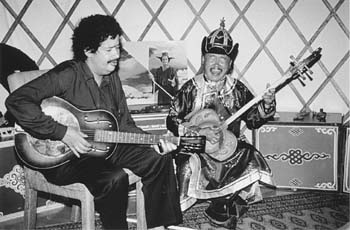![[MetroActive Movies]](/movies-arts-entertainment/gifs/movies468.gif)
[ Movies Index | San Francisco | MetroActive Central | Archives ]
Tuva Solo
In 'Genghis Blues,' a team of San Franciscans visit the throat-singing capital of the world
By Richard von Busack
Kyzyl! who hasn't wanted to voyage to that mecca of throat singers, capital of Tuva? If you lived there, you'd be home now. The city of Kyzyl--pronounced "kazil"--in the heart of Central Asia, is the setting for much of the unique documentary Genghis Blues.
The Autonomous Republic of Tuva is a nation of 300,000 located outside Outer Mongolia. Among its cultural assets is a bloodless yet grisly method of slaughtering sheep (supposedly devised by Genghis Khan). More important is the great national art form: throat singing, a technique of vocalizing four different notes at once.
How to describe this unearthly song? As Asian cowboy music, only with the yodels emitted at several octaves lower than Roy Rogers? Like an operatic cicada? The guttural chuckle of Popeye set to music? Alto didgeridoo accented with toy whistles and a little bit of chainsaw motor thrown in for drone? In a world where you can't escape Madonna, a completely unusual sound is a precious resource. The Tuvans have been practicing theirs for centuries.
How Tuva became known outside the South Dakota-sized nation is the subject of Roko Belic's documentary. The story begins with Paul Pena, a local blues singer who has performed with John Lee Hooker, Muddy Waters and T-Bone Walker.
Pena, grieving after the death of his wife, heard a Radio Moscow program of Tuvan music. Fascinated, Pena backward-engineered the technique of throat singing, augmenting his knowledge by listening to CDs he purchased from San Francisco's Round World Records. Since there is no English-Tuvan dictionary, Pena translated the language from Tuvan into Russian and from Russian into English. In Braille. Like more than a few blues singers, Pena is blind.
In 1993, a master of Tuvan music named Kongar-ol Ondar came to California to perform live, record with Frank Zappa and the Kronos Quartet and march in the Rose Parade. Pena buttonholed Ondar after a concert, singing a Tuvan throat song to catch his attention. Pena performed so well that he was invited to Kyzyl for a once-every-three-years contest of throat singers.
The trip to a notoriously remote spot was a real hardship for him. Fortunately, Pena had friends who were micropatrologists (i.e., students of very small countries; thanks to cartoonist Eddie Campbell for coining this term). Pena was escorted by travelers calling themselves "Friends of Tuva."
In Tuva, the Westerners explored the country by untrustworthy car. It's a country of pasture land, bisected with rutted tracks, shadowed by snowy mountains, where the temperature extremes vary about 150 degrees during the course of the year. "Not a place for a middle-of-the-roader," noted one previous Western visitor, the great physicist Richard Feynman.
The trip to tuva makes for fascinating viewing, at first. Certainly, it's touching to see how Pena can be so gifted in music and so thwarted by his health and lack of sight. Actually, Pena's refusal to deal with his handicap in a glad, forgiving way is understandable, and his irascible qualities make him a blunt, lovable ambassador to this remote country.
Tuva is host to 100,000 Russians--a fact referred to elliptically by one Tuvan who observes, "There are people who have lived here for years who don't understand the Tuvan language." When the Russians annexed Tuva without a struggle, they banned the language (just as the U.S. did in Hawaii) while cutting off the country from the outside world. This should have buried the culture, but it thrives. Pena's performance of the kargyraa style, turning the bluesman's growl into the scary lowing of the accomplished throat singer, is remarkable-- and yet it's chilling to see that kinship between two very different forms of music separated by so much space and time.
Sober, dry-humored narration ("And then we attended the first of many sheep-slaughtering ceremonies held in our honor") helps mitigate the length of the drives through the countryside. Filmmaker Roko Belic and his co-writer brother Adrian said that they were stimulated to make films via a childhood spent watching public television. The Belics' mom played a brilliant trick on them when they were kids, snapping off the dial of the TV set with pliers and claiming that the television was broken and would only pick up PBS.
Except for Pena's salty language, Genghis Blues is perfect for PBS, even with the slower pacing of the travelogue spots, during which one would customarily go fetch a beer or yak with the roommates. But that's just the Westerner in me, uneasy with the Eastern sense of time.
In one's hot fury at the monstrosity of the recording industry, it's possible to forget that technological miracle that allows the song of a Central Asian horseman to be heard in a San Francisco flat. And Genghis Blues reminds you of that miracle. Surprising, well edited and with a one-of-a-kind subject matter, Genghis Blues leave not just Pena but the viewer with a lump in the throat .
[ San Francisco | MetroActive Central | Archives ]
Copyright © Metro Publishing Inc.
![]()

Sound Travels: A blind blues singer heeds the wild call of the Tuva throat-singers in 'Genghis Blues.'
Genghis Blues (Unrated; 88 min.), a documentary by Roko Belic, plays through July 14 at the Castro Theater.
From the July 5, 1999 issue of the Metropolitan.